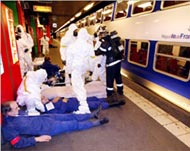Bomber holds France to ransom
The French government has received a series of blackmail letters from an unknown source threatening to explode bombs on the railway system unless a ransom of more than $5 million is paid.

The letters were sent over the course of the last weeks to President Jacques Chirac and Interior Minister Nicolas Sarkozy, and were signed with the initials AZF.
No group or person with these initials is known to police.
AZF is the name of a chemical factory that blew up in the southern city of Toulouse in September 2001, killing 30 people and injuring about 1000 others.
In one of the letters, the author said 10 devices had been planted across the French railway network, and these were fitted with timers to go off at intervals unless four million dollars and one million euros were handed over.
One bomb found
The interior ministry said one device was discovered on 21 February on the railway line from Paris to Toulouse.
“After tests the device was shown to be dangerous in as much as it could have smashed the track,” the ministry said.
Michel Gaudin, director-general of the national police, said the threat was being taken seriously.
The police had had “one very very brief telephone contact” with the blackmailer, he told LCI television.
Police mobilised
 |
|
Paying a ransom could easily |
The prosecutor’s office in Paris has opened a judicial investigation, which is being led by the country’s top anti-terrorist judge, Jean-Louis Bruguiere.
“All branches of the police and gendarmes are mobilised on this affair. They are trying to unravel it with one single imperative: the safety of the public,” the interior ministry said.
Sophisticated device
According to police the bomb found on the track near the village of Folles, in the Haut Vienne department of central France, was in a round white tupperware box and made of “a classic nitrate-fuel mix.”
It had a detonator and timing system.
“It was a device worthy of an explosives expert or at least a very gifted student,” a police official said. “However, voluntarily or accidentally it could not have gone off.”
The device was removed and exploded in test conditions next to a section of railway track, which it blew 25 metres into the air, the official said.
Interior ministry officials said a rendez-vous was arranged with the blackmailers for Monday afternoon, but it was aborted.